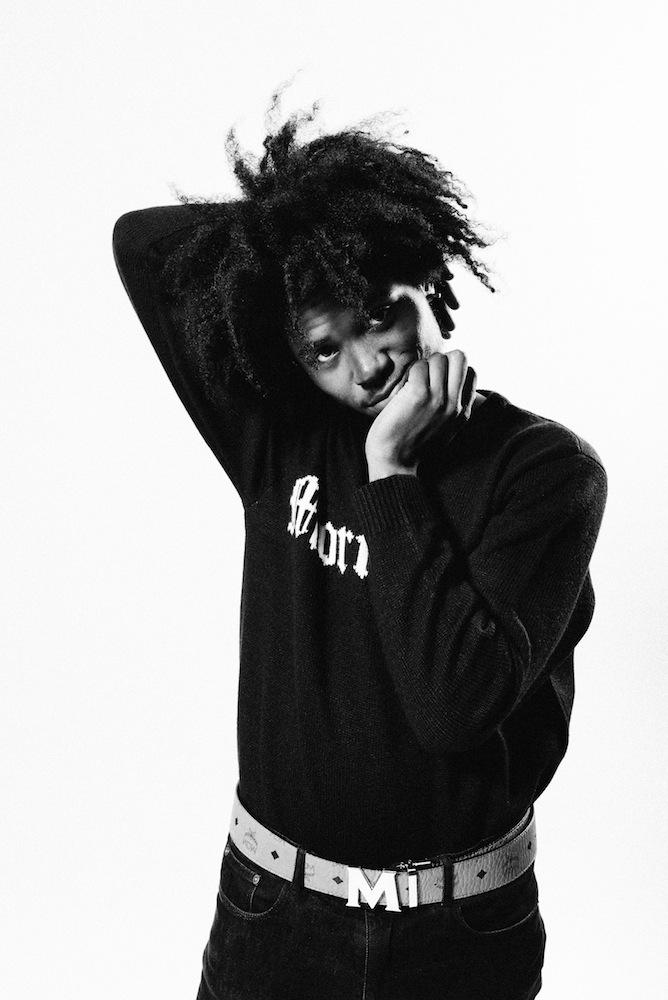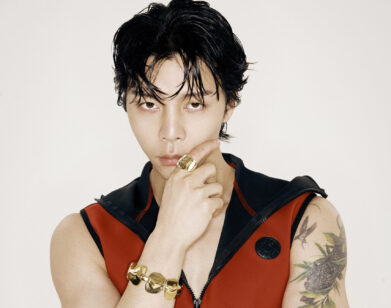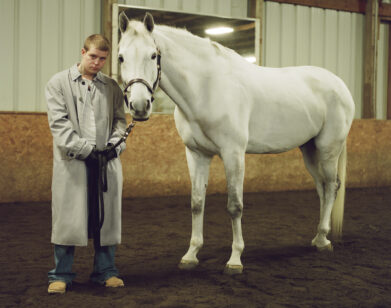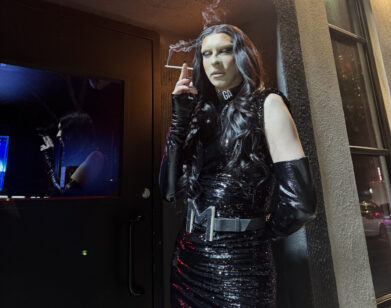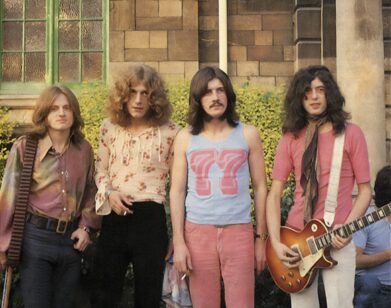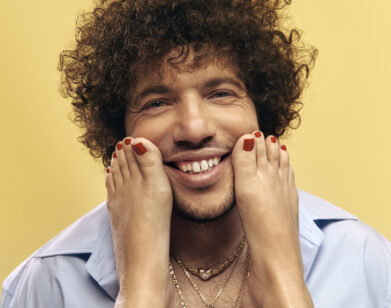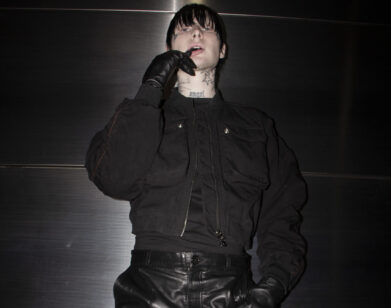Discovery: De’Wayne Jackson
DE’WAYNE JACKSON IN LOS ANGELES, MAY 2017. PHOTOS: CARA ROBBINS.
Astrology may not hold much weight for many people, but it does for De’Wayne Jackson, whose sign colors the way he approaches the most important thing in his life: music. Born on June 27, 1995, Jackson is a Cancer, meaning he is deeply emotional and creative. His debut EP, Don’t Be Afraid—which is streaming in full exclusively below—was made with this in mind. Each of its five songs was created organically and speaks to the aspects of Jackson’s life that he feels are part of a bigger picture.
“When we were creating it, we just made the music,” recalls Jackson. “[Andre Paxton], my producer, would play something, and I would go at it and let these stories come from my heart. I see them as things I had to say. The way I write music is all feeling for me, and I feel like it comes from a beautiful place somewhere in the earth.”
Jackson pulled inspiration for the EP from his childhood growing up in Spring, Texas, just outside of Houston. Its influence is palpable: he stacks bluesy guitar and piano chords that mimic the gospel music he sang in church against a strong R&B backbone that he developed through L.A.’s flourishing music scene. The result is a sensitive, wistful collection of songs that demonstrates a fraction of his experience as a young black man who moved away from home for his artistic pursuits, and lives in a political climate that often doesn’t feel as modern as it should be.
When Interview catches Jackson by phone, he is in Burbank, California, planning out the tour he wants to go on and thinking about the energy that will inspire him when he visits New York City next month.
KATRINA ALONSO: You said once that when you were younger, your parents had a set path in mind for you. You’d go to church, you’d go to college, and you’d have one job for the rest of your life.
DE’WAYNE JACKSON: Right. That was it. There’s nothing wrong with that, it’s just that it was definitely for them and that’s what they wanted, and I never wanted that.
ALONSO: Have their views changed at all since you started making music?
JACKSON: Yeah, my mom is really supportive of it now. She actually came down here about a month ago and surprised me. That was a really amazing moment. I got to take her to the studios and stuff. She was real proud. My dad’s really excited for me.
ALONSO: Oh, that’s so sweet.
JACKSON: Yeah, it was really cool. [laughs] I was excited. My dad, he’s always been really supportive, but my mom and my stepdad, they were just like, “Oh, I don’t know…” But now they’re really on board with me. They really support it and share it around, and that’s all I really wanted, for them to be happy with it.
ALONSO: Do you think they play a role in inspiring you?
JACKSON: Oh, definitely. A lot of my music is about my family. Even if it’s rebelling against it, or really appreciating the love and the path that they gave me—though I chose another way to live my life—it really does inspire me, the way they work hard and take care of their family. I have to respect that. They live an adult life and they’re responsible, and I really appreciate and respect that. They’ve given me nothing but love, and it’s inspiring to see how hard my mom works, honestly. I just want to make her happy.
ALONSO: The influence of the Houston R&B scene that you grew up with and the gospel music that you would sing in church is so clear on this EP. Does L.A. inspire you the same way Houston did?
JACKSON: Oh, man. It does, but it inspired me in the way that L.A. showed me real life. I came out here, and my friend left that I came out here with, so for about six or seven months I was in the apartment alone, in this small studio apartment, which I’m sure you probably understand as far as the New York grind. But it was a really small apartment. I had a blow-up mattress that didn’t blow up after a couple of weeks. I was working two jobs at Sherwin-Williams and Taco Bell, and I was dealing with life. In Houston, it seemed like I was a kid. I went to school in the suburbs of Houston, so I was an outsider and I was weird. I really liked music, but once I moved to L.A., I was just like, “Life is this. It’s kind of hard.” I was in the middle of Hollywood, so L.A. inspired me to tell these stories that I’m telling and really find what I like to write about, but also, that I need to write about the way I’m living and what I deal with in my daily life. My transition was good, but it really gave me my story and what I wanted to tell people. That’s how it inspired me: waking me up to life. [laughs]
ALONSO: Were there any specific experiences that inspired this EP? Any particular wake-up moments?
JACKSON: Definitely. Working at Taco Bell and getting home at two in the morning, that was so different from home. In “Old Steps,” the first song, I say, “I stare from a porch like it’s a different one this time / Where I came to gain a name but lose my mind.” That’s something that was really inspired by living at my apartment, because I felt like I was starting to get a little that life was very hard. It’s a lot about freedom. In the last song, “Coming Back Home,” it was talking about coming back home mentally, and what if I never came here to learn these things about life and about Spring? L.A. definitely inspired the whole Don’t Be Afraid EP, every step of the way here. It’s really about freedom, of telling people my story and being free, and honestly, not being afraid. The title was as simple as it sounds because I wanted to tell people this. I’ve been talking to people from back home since we’ve released the pre-orders and stuff. It’s just like, “Man, we really feel like you give us a chance.” That’s literally all I want to do. My parents were telling me, “You do this, you do that, and that’s how life works.” But to go out on a limb, people need to see stuff like that, especially when you come from a place where that’s not really available.
ALONSO: I picked up on a lot of the Black Lives Matter activist notes on the EP. You have a lot of powerful lyrics in “Old Steps” and “Do What We Want To” and “Coming Back Home,” and even the title of the EP can be interpreted as an activist slogan in a way.
JACKSON: Definitely. I definitely am on that side. I want to show it more, even, because I want to be a voice that matters, and every lyric that I say, I stand behind. I’m not trying to write to appease people. I want to say something everytime I say a word on my songs, so I really appreciate that you noticed that.
ALONSO: How do you want your music to contribute to the landscape of the Black Lives Matter movement in today’s political climate?
JACKSON: If people do hear my music and they feel a certain way about it in that realm, I want them to know that I’m right behind them. I want to be in the marches. I haven’t even been able to go to one, but I definitely want to make that happen. The stuff that I’m speaking on in the EP is because in Spring, I went to a more white school. I dealt with stuff like that. Texas is still what people say it is, other than the horses and stuff. You know, we’re not running things in Texas. I’m always inspired by that and like that line in “Coming Back Home,” I was saying, “The man never serves me / But I have to serve him.” What if we flip it? So if people listen to my music and they feel anything from it, I want them to know I’m a real person, and I’m also a black man with an afro who cares about my people. I stand up for them, anytime, 24/7.
ALONSO: What would you say to the other artists in the world who want to use their music to express their support for activism?
JACKSON: I would say don’t be afraid, honestly. They should do it because music matters so much. These kids, these grown-ups, people that will listen to this music, it goes both ways, because you’ve got the turn-up music, and when kids listen to that—even though these artists are not turning up the way they say they are—they’re going to turn up. But when you have the few artists that are saying something and it’s meaningful, kids listen to that too, and they put those artists on a pedestal as well. I would say do it. Stand for something. I can’t tell everybody to make conscious music, or whatever people want to say it is, but say something that matters. Have some depth behind what you’re saying, because these kids are listening, and the world is listening. That’s what matters to me, but maybe it’s how I was raised. You should definitely be saying something, if you’re saying anything.
DON’T BE AFRAID IS OUT TOMORROW, MAY 26, 2017. FOR MORE ON DE’WAYNE JACKSON, VISIT HIS FACEBOOK.

